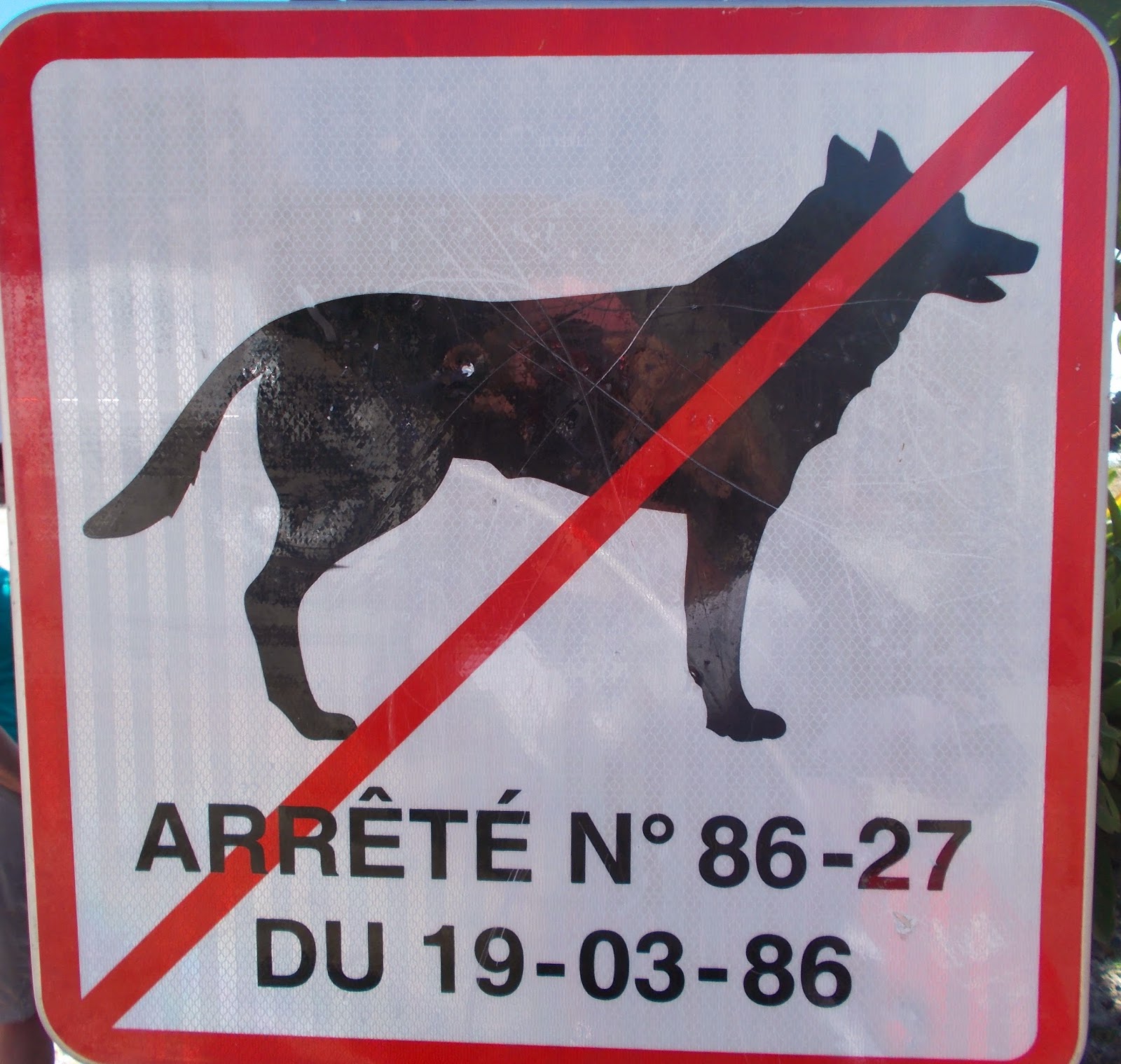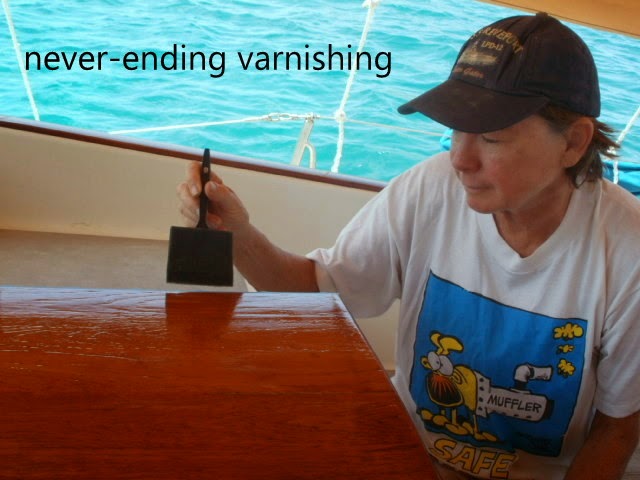Return to Grenada from
the British Virgin Islands.
Via Saint-Barthelemy,
Marie Galante, and The Grenadines
On Feb
25-26, we departed the British Virgin Islands to re-cross the Anegada
Passage, bound SE, and discovered that departure from Cane Garden Bay
and the Thatch Island Cut is not ideal because of the current running
out of the Francis Drake Channel. For too many hours we bucked a 3
knot head current. Too late we learned that the more favoured
departure is from the North Sound of Virgin Gorda, or even Anegada
Island. Having learned so much from our past mistakes, we plan
to make many more in the future.
After
the delay with adverse current, the first 24 hours at sea went well,
with good progress toward the SE. However, at 1100 hr of day two, 25
nm from Saba, we encountered an unexpected “trough”, or band of
squalls, with wind clocking to SE 20 knots. This effectively
stopped our progress toward the SE, so we diverted toward the NE and
made for Ile de Saint-Barthelemy (St Barths). Concerned about a
night-time arrival in a harbour that we had not visited since 2005,
we directed our approach toward the mega-yachts that are lit “like
Christmas trees”, and were happily anchored in the midst of million
$ boats by 2100 hr. The anchor holding
was good in 15 m of water. Time for a “tot”, having
“spliced-the-main-brace”!
Saint-Barthelemy
We
laid-over at anchor at St Barths Feb 27- Mar 1, having a pleasant
time at this unexpected stop. Gustavia is a scenic harbour.
There is every diversion for moneyed visitors, including the boat where one can look underwater without getting wet. We reminisced about the Beatles and the Yellow Submarine.
There is every diversion for moneyed visitors, including the boat where one can look underwater without getting wet. We reminisced about the Beatles and the Yellow Submarine.
This
is, of course, a centre for seriously BIG boats. We enjoyed their
company, including the gymnastic window washers on the “floating
condominiums”.
There
is a lot of history here. Wars for possession played a major role,
and left many artifacts, from forts to anchors.
Speaking French here is not mandatory, but French politeness and
congeniality are everywhere apparent. The Swedish influence is still present on this now French Island.
The
restaurants are fabulous! For the true gastronome, they alone would
be reason to visit. So, pray understand that we have to show some of
the meals we enjoyed!
At Do Brazil.
St
Barths has lovely beaches.
The beaches are protected by sensible, and enforced, ordinances to maintain their pristine quality.

Even
road signs are creative, and, hopefully, effective.
From St
Barths we sailed further south on Mar 2-3, past the windward side of
Montserrat, the lee sides of St Kitts/Nevis, and the big island of
Guadeloupe. On reaching the south end of Guadeloupe, we turned E and
motored against light E wind to the island of Marie-Galante, part of
the country of Guadeloupe, one of our favourite cruising grounds.
On this
segment of the passage, we had several large flying fish “volunteer”
to be breakfast by landing on our deck overnight. Found at first
light and consumed shortly thereafter.
We laid
over at anchor at St Louis, Marie-Galante, Mar 4-12 for some
wonderful experiences. It was Carnival Time! Click on the video
clip below to see lots of folks having fun. We admire the variety of
improvised musical instruments.
From
these next two video clips you might appreciate the efforts to
produce the diversity of Carnival costumes. They also document the
healthy lack of concern about “body image”. Let it all hang
out! Shake your booty!
There is a strong music culture here. We were fortunate to chance upon jazz on the beach at sunset. Click on the video for a sample.
We were
happy to visit again with M/Mme Pierrot, who operate a beachfront
restaurant/bar, and we again enjoyed their company, especially with
their granddaughter visiting. We have a common vocabulary of only a
few hundred words, but manage to get along just fine. We learn a few
more French words every time we visit with them, and they a few more
English words. They believe we know more French than we actually do.
Sugar Cane is a major part of the economy of Marie-Galante. The harvested cane is transported from fields throughout the island to several rum distilleries, where it is crushed to extract the sugary juice. The juice is concentrated in boilers fueled by the crushed cane, fermented and distilled into rum.
The
“lait de tigresse” is bottled in a semi-automated assembly line.
Click on the videos below to understand the process of bottling.
After
our tour of the distillery, we went to the “tasting room”, and,
after much deliberation, purchased five bottles Pere Labat rum for 5
Euro each with sixth bottle free. So, we increased our contribution
to the local economy.
Sugar
cane cultivation and rum production have a long history on
Marie-Galante, dating back at least to 1669. The plantation owners
became wealthy, and built large plantation homes, on the backs of slaves working in the cane fields.


The sugar/rum industry collapsed with the abolition of slavery about 1840, and did not revive until machinery was developed to allow a few paid labourers to produce what hundreds of slaves had before.
There
is considerable fishing activity in the waters around Marie-Galante.
From what we saw, it appears to be little more than a subsistence
fishery. There is a retail fresh fish market, which we did patronize
for nice fish, but it is lightly stocked.
Livestock production is also carried out. There is a local retail market for fresh meat. However, frozen chicken “from away” is more in evidence than fresh local meats.
Livestock production is also carried out. There is a local retail market for fresh meat. However, frozen chicken “from away” is more in evidence than fresh local meats.
Tourism
is another contributor to the GNP. Ferries arrive daily from the
big island of Guadeloupe. And where there are tourists there are
restaurants!




The coconut ice cream is made on the spot and delicious! Which would explain the increase in our girth!
There
are numerous walking trails on Marie-Galante, ranging from short-easy
to long-steep. We know some of them from previous visits. It seemed
more difficult on this visit to obtain trail maps, as the tourist
info kiosks were often closed, but we did “walk about” here and
there.
Unfortunately,
as far as we could determine, all the shops renting bicycles are out
of business. Scooters and rental cars are readily available.
Tourists don't use legs anymore?
The sea
at the anchorage of St Louis, Marie-Galante, is “gin-clear” and
the seabed is crawling with starfish, small conch and sea-cucumbers.
We swam in the ocean everyday. One can see the orange starfish on
the bottom around the boat in the moon-light.
Marie-Galante has spectacularly beautiful beaches, perfect for swimming, walking, picnics or just plain loafing.

Marie-Galante has spectacularly beautiful beaches, perfect for swimming, walking, picnics or just plain loafing.

We
rented a car to tour the island. Capesterre is an interesting town
with many old buildings. In the country-side we had to deal with
“rural traffic jams”. Pani problem.
Of course, on a boat it can never be all play and no work. Maintenance cannot be ignored when the engine does not crank. Fortunately, we can do basic starter motor repair on-board. And varnishing is another favourite "diversion".
The Grenadines
On Mar
14 we departed Marie-Galante for the 46 hour passage to the
Grenadines. For multiple-day passages we prefer times around the
full moon, because the bright moon-light facilitates night-time
sailing. On these passages we rotate watches between the two of us;
three hours on, three off, around the clock, so there is always
someone awake in the cockpit. One soon decides what is most
important during their “off watch” times!
It was
a calm passage along the E sides of Dominica, Martinique, St Lucia
and St Vincent. Some of the time there was too little wind to manage
by sail alone, but, as portrayed in the video clip below, we had some
glorious sailing.
The calmer conditions did facilitate fishing, and it was productive! This fish was prepared for the table in at least 10 different ways, including grilled steaks, fish and rice, smoked fish spread, and fish-head soup. And then there were the two "bags" of roe!
The calmer conditions did facilitate fishing, and it was productive! This fish was prepared for the table in at least 10 different ways, including grilled steaks, fish and rice, smoked fish spread, and fish-head soup. And then there were the two "bags" of roe!
We were treated to a whale broaching, a large humpback, “like a freight train out of a tunnel”, two boat lengths behind the Charlotte D! Peter was “on watch” and just happened to be scanning astern. On the roaring broach, he hailed Catherine, resting below, and the whale broached again just as she got her head out of the companion-way. How considerate of the whale to repeat the performance for her. Spectacular! We were thrilled for hours!
We
passed through regions with heavy populations of “Man-O-War”
Jelly Fish, with the big Leatherback Turtles there to feed upon them.
At our
stop in Chatham Bay, Union Island, we enjoyed visiting with our
long-time friends Vanessa, Seckie and Mate.


A few days later, we pushed on southward to Tyrrel Bay, Carriacou, part of the country of Grenada. Simon greeted us and we purchased mangrove oysters from him.
This anchorage is scenic and peaceful. It is about 35 nm from our final destination of the 2013-2014 sailing season.
We are
scheduled to haul out the Charlotte D on March 28 for her summer
storage ashore at Spice Island Marine, on the S coast of Grenada.
So, on march 25, we enjoyed a magnificent beam reach sailing from Carricou to Prickly Bay of the big island of Grenada and on the next morning we started the decommissioning process, first by removing sailing and bagging them inside for the summer. We have ordered two new sails, which are here and ready for our pickup.
So, on march 25, we enjoyed a magnificent beam reach sailing from Carricou to Prickly Bay of the big island of Grenada and on the next morning we started the decommissioning process, first by removing sailing and bagging them inside for the summer. We have ordered two new sails, which are here and ready for our pickup.
We hope
you enjoyed our blog posts this season, and we look forward to
writing for you again during the 2014-2015 season. We look forward to seeing many of you on our "northern migration" and upon our return home to Nova Scotia. Entre-temps, vas
y voi. Bon voyage!
Peter
and Catherine, aboard S/V Charlotte D, Prickly Bay,Grenada








































































edit.jpg)








































